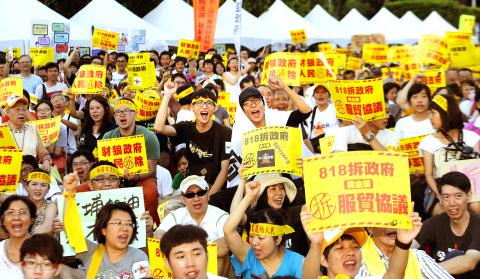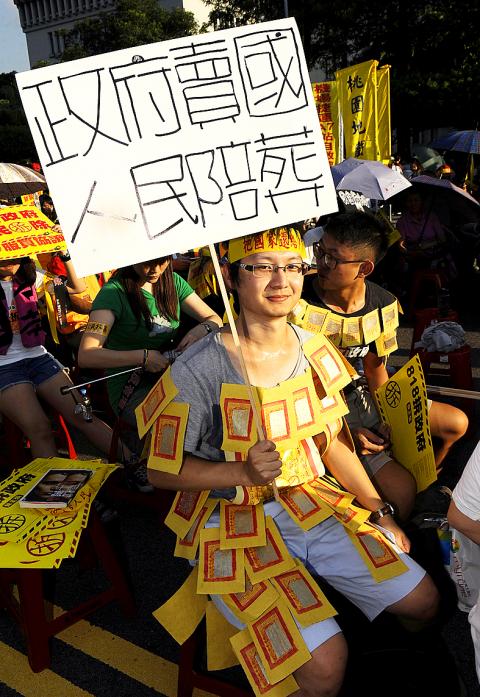Tens of thousands of people rallied yesterday in front of the Presidential Office in Taipei and marched to the Executive Yuan, calling on government officials to apologize for forced land seizures and to stop such policies.
“It is Aug. 18 today, and it was just three years ago, on Aug. 17, that the government promised Dapu [Borough 大埔] residents that their houses would be preserved, while their farmland would be relocated,” Taiwan Rural Front (TRF) president Hsu Shih-jung (徐世榮) said.
“After government officials failed to keep their promises and instead flattened private homes, they ask us to remain calm, but how can we stay calm?” Hsu asked.

Photo: Chen Chih-chu, Taipei Times
The crowd responded with cheering and applause.
“Apologize and compensate!” “Return the land to the people!” they shouted.
Hsu was referring to a negotiation meeting held in 2010 which featured Vice President Wu Den-yih (吳敦義), who was then premier; Premier Jiang Yi-huah (江宜樺), the then minister of the interior; and Miaoli County Commissioner Liu Cheng-hung (劉政鴻), following a series of protests against a plan to clear private land and homes to make way for a science park.

Photo: Chen Chih-chu, Taipei Times
However, despite government promises, four houses in Miaoli County’s Dapu were torn down unexpectedly on July 18, when the county commissioner sent in demolition squads escorted by police officers while the home owners and their supporters were in Taipei protesting the demolition plan.
Asked about the surprise demolition the day after, Liu called it a “god-given opportunity.”
“A month ago, we said that we will tear down the government if they don’t apologize, and now here we are,” said Liao Pen-chuan (廖本全), an associate professor at National Taipei University’s Department of Real Estate and Built Environment.
“We’re not flattening government buildings, but what we are going to do is to destroy the system, which is supposed to protect the disadvantaged. We’re also taking down politicians who are misusing the system to exploit the disadvantaged,” Liao added.
The crowd also set up a mock memorial hall for the county commissioner, with Liu’s portrait in the center, and flowers and incense burners in front of the portrait.
A bag of cow manure was also placed by the mock memorial for people to throw at Liu’s portrait.
“Liu Cheng-hung, cross over the bridge!” the crowd shouted, referring to a traditional belief that the spirit of a newly dead person crosses a bridge into the underworld for judgment.
Since it is believed that the spirits are confused and do not know the way, he or she needs to be reminded to cross the bridge.
Several other organizations for people affected by different development projects also showed up at the rally to show their support and to tell the crowd their stories.
The four families from the demolished houses in Dapu thanked the crowd for their support and promised they will stand with other victims of development projects from now on.
After the rally, the crowd made a stop at the Ministry of the Interior, which is in charge of approving development or urban projects, where they protested outside the building.
The protest was still ongoing as of press time.

US President Donald Trump yesterday announced sweeping "reciprocal tariffs" on US trading partners, including a 32 percent tax on goods from Taiwan that is set to take effect on Wednesday. At a Rose Garden event, Trump declared a 10 percent baseline tax on imports from all countries, with the White House saying it would take effect on Saturday. Countries with larger trade surpluses with the US would face higher duties beginning on Wednesday, including Taiwan (32 percent), China (34 percent), Japan (24 percent), South Korea (25 percent), Vietnam (46 percent) and Thailand (36 percent). Canada and Mexico, the two largest US trading

China's military today said it began joint army, navy and rocket force exercises around Taiwan to "serve as a stern warning and powerful deterrent against Taiwanese independence," calling President William Lai (賴清德) a "parasite." The exercises come after Lai called Beijing a "foreign hostile force" last month. More than 10 Chinese military ships approached close to Taiwan's 24 nautical mile (44.4km) contiguous zone this morning and Taiwan sent its own warships to respond, two senior Taiwanese officials said. Taiwan has not yet detected any live fire by the Chinese military so far, one of the officials said. The drills took place after US Secretary

CHIP EXCEPTION: An official said that an exception for Taiwanese semiconductors would have a limited effect, as most are packaged in third nations before being sold The Executive Yuan yesterday decried US President Donald Trump’s 32 percent tariff on Taiwanese goods announced hours earlier as “unfair,” saying it would lodge a representation with Washington. The Cabinet in a statement described the pledged US tariffs, expected to take effect on Wednesday next week, as “deeply unreasonable” and “highly regrettable.” Cabinet spokeswoman Michelle Lee (李慧芝) said that the government would “lodge a solemn representation” with the US Trade Representative and continue negotiating with Washington to “ensure the interests of our nation and industries.” Trump at a news conference in Washington on Wednesday announced a 10 percent baseline tariff on most goods

THUGGISH BEHAVIOR: Encouraging people to report independence supporters is another intimidation tactic that threatens cross-strait peace, the state department said China setting up an online system for reporting “Taiwanese independence” advocates is an “irresponsible and reprehensible” act, a US government spokesperson said on Friday. “China’s call for private individuals to report on alleged ‘persecution or suppression’ by supposed ‘Taiwan independence henchmen and accomplices’ is irresponsible and reprehensible,” an unnamed US Department of State spokesperson told the Central News Agency in an e-mail. The move is part of Beijing’s “intimidation campaign” against Taiwan and its supporters, and is “threatening free speech around the world, destabilizing the Indo-Pacific region, and deliberately eroding the cross-strait status quo,” the spokesperson said. The Chinese Communist Party’s “threats